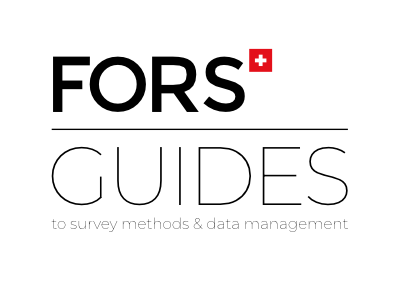FORS Guides to survey methods
If you want to collect your own data or just better understand the decisions behind data collection processes, these guides will give you interesting insights into measurement concepts, the development of questionnaires, survey modes, field organisation and monitoring and a lot of other topics regarding the collection and processing of data.
Representativity in surveys
Refusal conversion (FORS Guide N°04), Marieke Voorpostel
Surveying national minorities (FORS Guide N°06), Jessica M.E. Herzing, Guy Elcheroth, Oliver Lipps, Brian Kleiner
Incentives in surveys (FORS Guide N°08), Oliver Lipps, Jessica M.E. Herzing, Nicolas Pekari, Michèle Ernst Stähli, Alexandre Pollien, Gisana Riedo, Maud Reveilhac
Representativeness of surveys and its analysis (FORS Guide N°15), Michael Ochsner
Making uncommon experiences visible in the survey life cycle (FORS Guide N°24), Nora Dasoki, Guy Elcheroth, Sandrine Morel, Erika Antal, Robin Tillmann
Capturing the last phase of life in surveys (FORS Guide N°25), Clément Meier
Survey design
Mobile web surveys (FORS Guide N°01), Jessica M.E. Herzing
Panel surveys: advantages and disadvantages compared with repeated cross-sectional surveys (FORS Guide N°14), Oliver Lipps
How to measure…
Measurement of income in surveys (FORS Guide N°02), Ursina Kuhn
Measurement of social position in surveys (FORS Guide N°10), Robin Tillmann
Measuring party affiliation (FORS Guide N°12), Georg Lutz, Lukas Lauener
Measuring psychological constructs (FORS Guide N°22), Valérie-Anne Ryser
Measuring assigned sex, gender identity, and sexual orientation in population surveys (FORS Guide N°26), Christina Bornatici, Max Felder, Lavinia Gianettoni, Roxane Mordasini, Stephanie Steinmetz
Data processing
Preparation of survey data (FORS Guide N°13), Alexandre Pollien, Jessica M. E. Herzing, Erika Antal
Data Linkage (FORS Guide N°18), Giannina Vaccaro, Elfie Swerts
FORS Guides to data management
The correct, fast and easy handling of data is a major concern of all researchers collecting and processing data. The guides provide you with useful knowledge around your data management, from the planning to its implementation, the consideration of ethical issues and data protection until the final archiving and sharing of your data.
Data management
How to draft a DMP from the perspective of the social sciences, using the SNSF template (FORS Guide N°07), Pablo Diaz, Alexandra Stam
Ethics and data protection
Ethics in the era of open research data: some points of reference (FORS Guide N°03), Pablo Diaz
The informed consent as legal and ethical basis of research data production (FORS Guide N°05), Sybil Krügel
Data anonymisation: legal, ethical, and strategic considerations (FORS Guide N°11), Alexandra Stam, Brian Kleiner
Data protection: legal considerations for research in Switzerland (FORS Guide N°17), Pablo Diaz
Qualitative data anonymisation: theoretical and practical considerations for anonymising interview transcripts (FORS Guide N°20), Alexandra Stam, Pablo Diaz
Quantitative data anonymisation: practical guidance for anonymising social science data (FORS Guide N°23), Brian Kleiner, Marieke Heers
Reproducible research
Pre-registration and registered reports (FORS Guide N°09), Marieke Heers
Replication in the social sciences (FORS Guide N°16), Marieke Heers
Data sharing and citation
Data Citation: How and Why Citing (Your Own) Data (FORS Guide N°19), Christina Bornatici, Nicolas Fedrigo
Data Sharing in the Social Sciences (FORS Guide N°21), Marieke Heers


 Bâtiment Géopolis,
Bâtiment Géopolis, +41 (0)21 692 37 30
+41 (0)21 692 37 30

